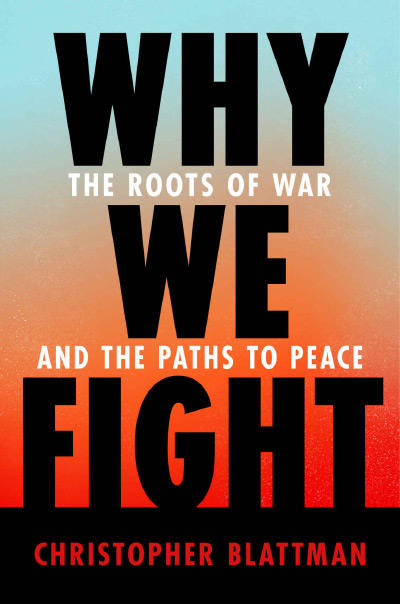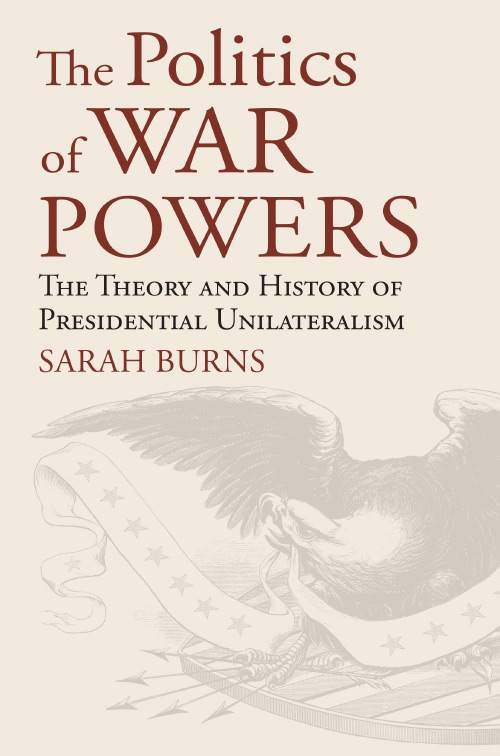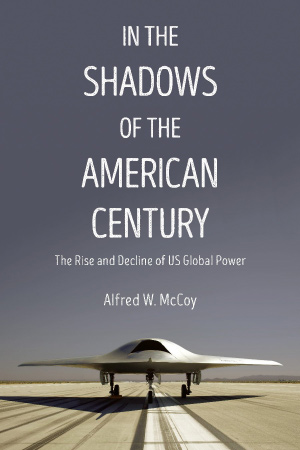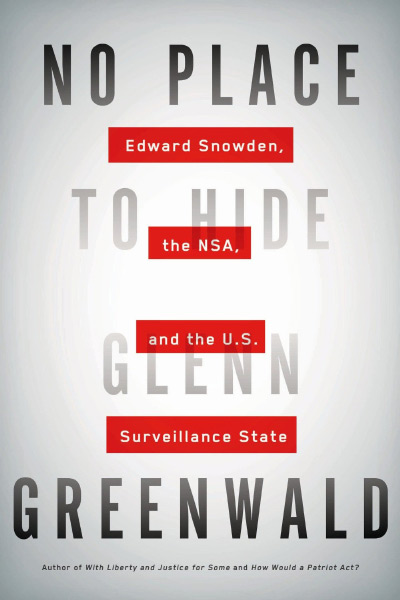America’s favorite son, the indebted, slaveholding bon vivant Thomas Jefferson, set the tone for modern political economy by substituting the right to “pursuit of happiness” for the common-law right of property. Jefferson’s novel right, which the state now labors to guarantee, nominally entitles every American to live happily at the expense of someone else’s effort, sacrifice, blood, and treasure. The upshot, as the economist Leland Yeager observes, is that government has become the weapon of choice in the ongoing Hobbesian war of each against all.
Political theorists John Mearsheimer (University of Chicago) and Stephen Walt (Harvard University’s Kennedy School of Government) show how the right to the pursuit of happiness presently enables foreign governments to exert adverse influence over foreign-policy questions of war and peace simply by coordinating the expression of private citizens’ ostensible self-interest. Public-choice scholars and other curious individuals will relish the analysis and insights presented in The Israel Lobby and U.S. Foreign Policy. The work documents the means by which the American-Israel Public Affairs Committee (AIPAC) established itself as the fourth node in America’s militaryindustrial-congressional complex by conditioning elected and appointed officials to fashion Middle East policies that are inimical to U.S. strategic interest.
Public officials understandably incline toward describing their response to factional pressure as a passive, Pascal-style wager: “There is no political advantage to not signing [a piece of controversial legislation pushed by the Israel lobby]. If you do sign you don’t offend anyone. If you don’t you might offend some Jews in your state” (p. 140, quoting an unnamed senator). The lobby, by contrast, describes public officials as competing to “outdo their colleagues by showing that their pro-Israel credentials are stronger than the next guy’s” (p. 311, quoting an unnamed Jewish activist). Although the authors characterize public officials as typically voting and deciding Middle East policy according to their best judgment of U.S. national interest, the book’s analysis speaks differently, not only implying the customary venality, but also describing a class of public officials who knowingly and consistently choose against their country’s strategic interest in matters that affect Israel.
The present volume began life as a similarly titled article published in 2006 by the London Review of Books. The Atlantic Monthly encouraged the work initially, then abandoned it abruptly and apparently without explanation after two years of effort by the authors. The book, like the article that preceded it, has drawn intense criticism, including the usual hackneyed charge of anti-Semitism. (The slur is a social construction that characterizes antipathy toward Jews and Israel, but not toward Semitic Muslims and Arab states.) The authors respond by noting that this slur is leveled reflexively against anyone with the temerity to comment unfavorably on any aspect of Israel and its U.S. supporters. The slur, which stimulates the very beliefs and behavior that it purportedly condemns, is evidently losing its ability to terrorize and intimidate, and thus to quiet Middle East policy debate. The authors express hope that their work and the follow-on discussion that it precipitates will accelerate this trend.
Mearsheimer and Walt nevertheless approach their topic with the sort of conspicuous caution that nearly belies their claim of progress. They begin by explaining that they too are “pro-Israel in the sense that we support its right to exist, admire its many achievements, want its citizens to enjoy secure and prosperous lives, and believe that the United States should come to Israel’s aid if its survival is in danger” (pp. 113–14). They repeatedly remind the reader of their conviction that “there is a strong [but also diminishing] moral case for Israel’s existence” (p. 15), and they stress that their work does not challenge “Israel’s right to exist or [question] the legitimacy of the Jewish state” (p. 12). Despite documenting the ways in which “Israel has become a strategic liability for the United States” (p. 50), they conclude that any effort to mitigate the Israel lobby’s influence “would clearly be anti-Semitic” (p. 349).
The authors do not elaborate on their assertion of Israel’s existential legitimacy. Many readers will disagree with the claim for the same reasons articulated by Israel’s first prime minister, David Ben-Gurion, whom the authors quote on point: “‘If I was an Arab leader I would never make terms with Israel. That is natural: we have taken their country. Sure, God promised it to us, but what does that matter to them? Our God is not theirs. We come from Israel, it’s true, but two thousand years ago, and what is that to them? There has been anti-semitism, the Nazis, Hitler, Auschwitz, but was that their fault? They only see one thing: we have come here and stolen their country. Why should they accept that?’” (p. 96). When repeated today, Ben-Gurion’s candid assessment is condemned reflexively as either anti-Semitic or self-hating.
The assertion of Israel’s existential legitimacy hangs on three points: first, that “the history of the Jewish people and the norms of self-determination provide ample justification for a Jewish state” (p. 12); second, that the right “is now endorsed by more than 160 countries around the world” (p. 112); and third, that “Americans recognize the long history of Jewish suffering and believe that it is desirable for the Jewish people to have their own state” (p. 338). Israel bolsters its provenance by maintaining one of the world’s most formidable and active military forces.
Examining the Israel lobby as they would any other factional interest, the authors note with clinical detachment that “[t]he influence of the Israel lobby on U.S. foreign policy merits the same scrutiny as the impact of energy interests on environmental regulations or the role of pharmaceutical companies in shaping policy on prescription drugs” (p. 111). They conclude that “the activities of the groups and individuals who make up the [Israel] lobby are the main reason why the United States pursues policies in the Middle East that make little sense on either strategic or moral grounds” (p. 11). They cite surveys that rank AIPAC as one of Washington’s most powerful lobbies, the equal of the American Association of Retired Persons and more effective than the National Rifle Association and the AFL-CIO. “Although the lobby does not get everything it wants, it has been remarkably successful in achieving its basic aims” (p. 335). The authors attribute much of this success to AIPAC’s effective lobbying and its skillful coordination of lobbying efforts by other pro-Israel groups and individuals. The balance of its success is attributed to the ability to raise and channel campaign contributions. The authors cite a study by The Economist showing that “pro-Israel groups contributed nearly $57 million to candidates and parties [between 1990 and 2004], while pro-Arab and Muslim PACs [political action committees] contributed slightly less than $800,000” (p. 156).
The book points out that the “[t]he lobby is not always representative of the larger community for which it claims to speak” (p. 243). The lobby encouraged the U.S. war with Iraq even though American Jews opposed the war in significantly greater proportion than Americans overall. It also boasts of widespread support from the Christian community despite “little evidence of extensive direct lobbying of Congress by [Jerry] Fallwell or other prominent members of the Religious Right on the subject of Israel” (p. 139, quoting a survey of congressional aides). The authors characterize Christian Zionists as a “junior partner” in the Israel lobby.
Mearsheimer and Walt conclude that
lobbying on behalf of Israel is wholly legitimate, as are overt efforts to shape public perceptions by participating in public discourse about matters relating to Israel. We do not think the lobby’s current influence serves the interest of either the United States or Israel, but most of its tactics are reasonable and simply part of the normal rough-and-tumble that is the essence of democratic politics. Unfortunately, some pro-Israeli individuals and groups have occasionally taken their defense of Israel to illegitimate extremes, attempting to silence individuals who hold views they dislike. This endeavor can involve intimidating and smearing critics of Israel, or even attempting to damage or wreck their careers. (p. 185).
They seem unconcerned that some U.S. citizens and members of Congress might be acting as unregistered agents of a foreign power, engaging in activities that are easily characterized as treasonous in wartime.
The authors further conclude that it “was the Israeli lobby, and especially a group of neoconservative policy makers and pundits who had been pushing the United States to attack Iraq since well before 9/11. . . . This is not to say that either Israel or the lobby ‘controls’ U.S. foreign policy; it is simply to say that they successfully pressed for a particular set of policies and were able, in a particular context, to achieve their objective. Had the circumstances been different, they would not have been able to get the United States to go to war. But without their efforts, America would probably not be in Iraq today” (pp. 230, 233). The authors also believe that “[i]f the United States does launch . . . an attack [against Iran], it will be doing so in part on Israel’s behalf, and the lobby would bear significant responsibility for having pushed this dangerous policy. And it would not be in America’s national interest” (p. 305). They raise similar concerns about the lobby’s influence over U.S. policy toward Syria, Lebanon, and the Palestinian people.
The book has three parts plus an additional 106 pages of detailed endnotes. The authors begin by documenting the “uncritical and uncompromising relationship” (p. 5) that the United States has with Israel and the extraordinary amount of financial and military aid it provides to Israel. They dismiss many of the “strategic” and “moral” justifications for this support, concluding that much of it is the consequence of efforts by the Israel lobby, whose metes, bounds, and methods they describe in detail. They surprisingly reject the conventional wisdom that U.S. Middle East policy is driven by concerns about oil, notwithstanding their later conclusion that protecting oil supplies is a paramount strategic interest. The book’s second part comprises case studies that document the lobby’s influence over U.S. policy toward individual Middle East nations and populations.
The book’s third and concluding section fittingly asks, “What is to be done?” The disappointing conclusion is that very little appears to be possible at this juncture. The authors dismiss broad measures for weakening factional influence generally. They also reject the propriety of measures aimed specifically at mitigating the Israel lobby’s influence on grounds that “trying to restrict support for pro-Israel groups would clearly be anti-Semitic” (p. 349). Similarly, they “would view attempts to form an explicitly ‘anti-Israel’ lobby with grave misgivings, as this sort of group could easily foster a resurgence of genuine anti-semitism” (p. 350).
Mearsheimer and Walt offer instead a deliberative, five-point proposal for “implementing a different approach” (p. 336). Their proposal entails “identifying U.S. interests in the Middle East”; “outlining a strategy to protect those interests”; “developing a new relationship with Israel”; “ending the Israeli-Palestinian conflict through a two-state solution”; and “transforming the lobby into a constructive force” (pp. 336–37). They assess and largely reject remedies that specifically target the Israel lobby, including: “weakening the lobby”; adopting policies that might “counter the lobby’s influence over elected officials and the policy-making process”; fostering more open discourse by encouraging academics and the media to “confront the lobby’s various arguments in order to correct enduring myths and expose the weaknesses in the lobby’s policy preferences”; and passively hoping that the lobby will “evolve in a positive direction, retaining its current influence, but advocating a different set of policies” (p. 349, emphasis in original).
The authors wax optimistic at this juncture because “the costs of failed policies [influenced by the Israel lobby] are now so apparent. . . . Although the lobby remains a powerful political force, its adverse impact is increasingly hard to overlook” (p. 355). Unfortunately, prospects for meaningful change are dismal. The authors duly recognize that all parties, including incumbents, “have too great a stake in the current system” (p. 349). Accordingly, they predict that “anyone who believes that the 2008 election will lead to markedly different policies is likely to be disappointed” (p. 348). Indeed.
| Other Independent Review articles by James A. Montanye | ||
| Summer 2018 | Digital Revolutions in Public Finance | |
| Winter 2015/16 | Does Altruism Exist?: Culture, Genes, and the Welfare of Others | |
| Fall 2014 | The Great Debate: Edmund Burke, Thomas Paine, and the Birth of Right and Left | |
| [View All (24)] | ||

















